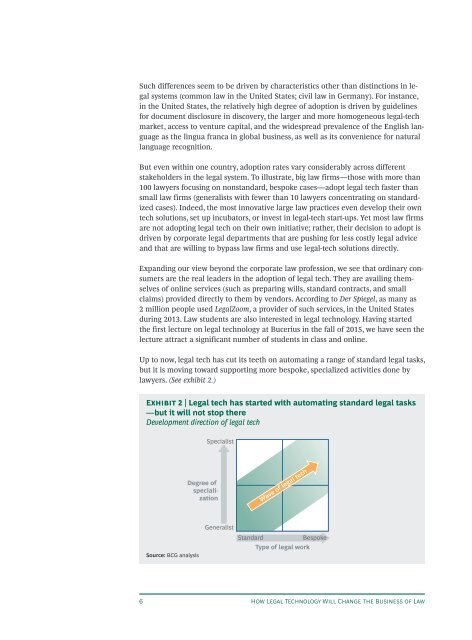How Legal Technology Will Change the Business of Law
1P2qOc3
1P2qOc3
You also want an ePaper? Increase the reach of your titles
YUMPU automatically turns print PDFs into web optimized ePapers that Google loves.
Such differences seem to be driven by characteristics o<strong>the</strong>r than distinctions in legal<br />
systems (common law in <strong>the</strong> United States; civil law in Germany). For instance,<br />
in <strong>the</strong> United States, <strong>the</strong> relatively high degree <strong>of</strong> adoption is driven by guidelines<br />
for document disclosure in discovery, <strong>the</strong> larger and more homogeneous legal-tech<br />
market, access to venture capital, and <strong>the</strong> widespread prevalence <strong>of</strong> <strong>the</strong> English language<br />
as <strong>the</strong> lingua franca in global business, as well as its convenience for natural<br />
language recognition.<br />
But even within one country, adoption rates vary considerably across different<br />
stakeholders in <strong>the</strong> legal system. To illustrate, big law firms—those with more than<br />
100 lawyers focusing on nonstandard, bespoke cases—adopt legal tech faster than<br />
small law firms (generalists with fewer than 10 lawyers concentrating on standardized<br />
cases). Indeed, <strong>the</strong> most innovative large law practices even develop <strong>the</strong>ir own<br />
tech solutions, set up incubators, or invest in legal-tech start-ups. Yet most law firms<br />
are not adopting legal tech on <strong>the</strong>ir own initiative; ra<strong>the</strong>r, <strong>the</strong>ir decision to adopt is<br />
driven by corporate legal departments that are pushing for less costly legal advice<br />
and that are willing to bypass law firms and use legal-tech solutions directly.<br />
Expanding our view beyond <strong>the</strong> corporate law pr<strong>of</strong>ession, we see that ordinary consumers<br />
are <strong>the</strong> real leaders in <strong>the</strong> adoption <strong>of</strong> legal tech. They are availing <strong>the</strong>mselves<br />
<strong>of</strong> online services (such as preparing wills, standard contracts, and small<br />
claims) provided directly to <strong>the</strong>m by vendors. According to Der Spiegel, as many as<br />
2 million people used <strong>Legal</strong>Zoom, a provider <strong>of</strong> such services, in <strong>the</strong> United States<br />
during 2013. <strong>Law</strong> students are also interested in legal technology. Having started<br />
<strong>the</strong> first lecture on legal technology at Bucerius in <strong>the</strong> fall <strong>of</strong> 2015, we have seen <strong>the</strong><br />
lecture attract a significant number <strong>of</strong> students in class and online.<br />
Up to now, legal tech has cut its teeth on automating a range <strong>of</strong> standard legal tasks,<br />
but it is moving toward supporting more bespoke, specialized activities done by<br />
lawyers. (See exhibit 2.)<br />
Exhibit 2 | <strong>Legal</strong> tech has started with automating standard legal tasks<br />
—but it will not stop <strong>the</strong>re<br />
Development direction <strong>of</strong> legal tech<br />
Specialist<br />
Degree <strong>of</strong><br />
specialization<br />
Wave <strong>of</strong> legal tech<br />
Source: BCG analysis<br />
Generalist<br />
Standard<br />
Type <strong>of</strong> legal work<br />
Bespoke<br />
6<br />
<strong>How</strong> <strong>Legal</strong> <strong>Technology</strong> <strong>Will</strong> <strong>Change</strong> <strong>the</strong> <strong>Business</strong> <strong>of</strong> <strong>Law</strong>


